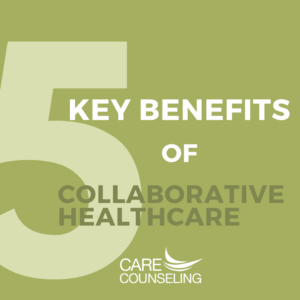Transforming Healthcare: 5 Key Benefits of Collaborative Care
 In the ever-evolving landscape of healthcare, the importance of collaborative care cannot be overstated. Collaborative care is a model that emphasizes teamwork among healthcare professionals to provide comprehensive and holistic patient care. In this blog post, we’ll explore five key benefits of collaborative care that are transforming healthcare for the better.
In the ever-evolving landscape of healthcare, the importance of collaborative care cannot be overstated. Collaborative care is a model that emphasizes teamwork among healthcare professionals to provide comprehensive and holistic patient care. In this blog post, we’ll explore five key benefits of collaborative care that are transforming healthcare for the better.
- Improved Patient Outcomes
One of the primary benefits of collaborative care is its positive impact on patient outcomes. When healthcare professionals from different disciplines work together, they bring a wide range of expertise to the table, resulting in more comprehensive and well-rounded care. For example, a patient with a chronic illness may benefit from the combined knowledge of a physician, nurse, pharmacist, and behavioral health specialist. This integrated approach ensures that all aspects of the patient’s health are addressed, leading to better treatment plans and improved health outcomes.
Additionally, collaborative care reduces the chances of medical errors and miscommunications between healthcare providers. When a team works together, they can cross-verify diagnoses and treatment plans, ensuring that the patient receives the most appropriate care. This ultimately leads to a higher quality of care and better results for the patient.
- Enhanced Patient Experience
Collaborative care also enhances the patient experience by providing more comprehensive and patient-centered care. Patients feel more supported and valued when they see a team of healthcare professionals working together to address their unique needs. This model allows patients to engage in shared decision-making, making them active participants in their care plan.
Furthermore, when healthcare providers collaborate, it often reduces the need for redundant or unnecessary tests and procedures. This can result in a more efficient and cost-effective healthcare experience for the patient. With the combined expertise of a collaborative care team, patients can also receive quicker and more accurate diagnoses, leading to faster treatment and relief from their health issues.
- Better Management of Chronic Conditions
Collaborative care is especially beneficial for patients with chronic conditions, such as diabetes, heart disease, or mental health disorders. These conditions often require ongoing management and coordination among multiple healthcare providers. A collaborative care team can work together to create a comprehensive care plan that addresses the physical, emotional, and psychological aspects of chronic illness.
For instance, a diabetic patient might have a team that includes a primary care physician, endocrinologist, nutritionist, and mental health counselor. This approach ensures that the patient’s medical, nutritional, and emotional needs are addressed simultaneously, leading to better disease management and improved quality of life.
- Reduced Healthcare Costs
While the initial setup of a collaborative care model may require additional resources, the long-term benefits can result in cost savings for both healthcare systems and patients. By preventing hospital readmissions, minimizing unnecessary tests and procedures, and improving patient compliance with treatment plans, collaborative care helps reduce healthcare costs.
Additionally, by focusing on preventive care and early intervention, healthcare providers can catch health issues before they become severe, potentially saving on the expenses associated with treating advanced diseases. In the long run, collaborative care can lead to a more efficient and cost-effective healthcare system.
- Increased Job Satisfaction for Healthcare Professionals
Collaborative care not only benefits patients but also healthcare professionals. When healthcare providers work in a team-based environment, they often experience increased job satisfaction. They have the opportunity to learn from their peers, share knowledge, and collectively problem-solve challenging cases.
The collaborative model also fosters a sense of camaraderie among healthcare professionals, reducing burnout and stress. This, in turn, can lead to higher retention rates, ultimately benefiting patients by ensuring a stable and experienced healthcare workforce.
Collaborative care is transforming healthcare by improving patient outcomes, enhancing the patient experience, better managing chronic conditions, reducing healthcare costs, and increasing job satisfaction for healthcare professionals. This model places the patient at the center of care, ensuring that all aspects of their health and well-being are addressed comprehensively.
As the healthcare industry continues to evolve, collaborative care is becoming increasingly important in providing the best possible care to patients.



























